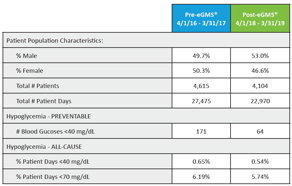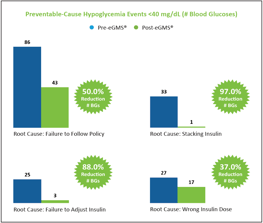Use of Technology Reduces Incidence of Hypoglycemia-Related Adverse Drug Events Among Patients Requiring Insulin Therapy While Hospitalized
Presentation
Diabetes Technology Society (DTS) Virtual Poster Meeting
Date
June 18, 2020
Authors
Debra Dudley, BS, RN, CDE, Mary Gaines, MSN, RN, BC-ADM
OBJECTIVE
Reduce hypoglycemia-related adverse drug events among patients requiring insulin therapy while hospitalized.
METHOD
Using insulin to control blood glucose while avoiding hypoglycemia is an essential but often challenging aspect of quality inpatient care. AdventHealth Waterman, a 269-bed community hospital in central Florida, realized an opportunity to reduce hypoglycemia-related adverse drug events. An interdisciplinary team was tasked with initiating appropriate glycemic management improvements, including implementation of the eGlycemic Management System® (eGMS®)* software for management of intravenous infusion and subcutaneous basal-bolus
insulin therapies in addition to order set revision and physician/nurse education.
Improvement strategies targeted four primary preventable causes of hypoglycemia-related adverse drug events:
(1) Failure to Follow Policy – occurs when nursing fails to follow policies/orders regarding insulin administration, hypoglycemia treatment, carbohydrate intake and/or IV fluids
(2) Stacking Insulin – occurs when patient is administered a second dose of insulin before the prior dose has cleared his/her system
(3) Wrong Insulin Dose – occurs when insulin dose, multiplier and/or target range is inconsistent with patient’s insulin needs, carbohydrate requirements and/or blood glucose trends
(4) Failure to Adjust Insulin – occurs when prescriber fails to adjust insulin dose according to changes in patient’s clinical condition and/or blood glucose trends
A retrospective analysis of hypoglycemia-related adverse drug events was performed comparing data prior to eGMS® implementation (April 1, 2016 – March 31, 2017) to after eGMS® implementation (April 1, 2018 – March 31, 2019). Prior to eGMS® implementation, the hospital utilized a different software for management of intravenous insulin therapy paired with physician-directed management of subcutaneous insulin therapy.
*eGlycemic Management System® is a registered trademark of Glytec, LLC on behalf of Aseko, Inc. All Rights Reserved.
RESULT
After eGMS® implementation, preventable hypoglycemia-related adverse drug events defined as the number of blood glucoses <40 mg/dL was reduced by 62.6%.
Likewise, all-cause hypoglycemia events defined as the percent of patient days with one or more blood glucoses <40 mg/dL was reduced by 16.9% and all-cause hypoglycemia events defined as the percent of patient days with one or more blood glucoses <70 mg/dL was reduced by 7.3%.
CONCLUSIONS
AdventHealth Waterman realized significant reductions in preventable hypoglycemia-related adverse drug events. Success is attributed to a combination of clinical practice changes and
quality improvement initiatives supported by a technology-enabled approach to insulin dosing via utilization of eGMS®.
Any hospital seeking to achieve best practice and clinical excellence in glycemic management should: (A) conduct a root cause analysis of hypoglycemia-related adverse drug events; (B) define the most appropriate targeted interventions; and (C) utilize education, accountability, workflow and policy measures. Attainment of goals can be optimized with utilization of eGMS®.
References
- Dudley D, Gaines M. Use of Technology Reduces Incidence of Hypoglycemia-Related Adverse Drug Events Among Patients Requiring Insulin Therapy While Hospitalized. DTS Virtual Poster Meeting. June 18, 2020.
ECO #0848-A


